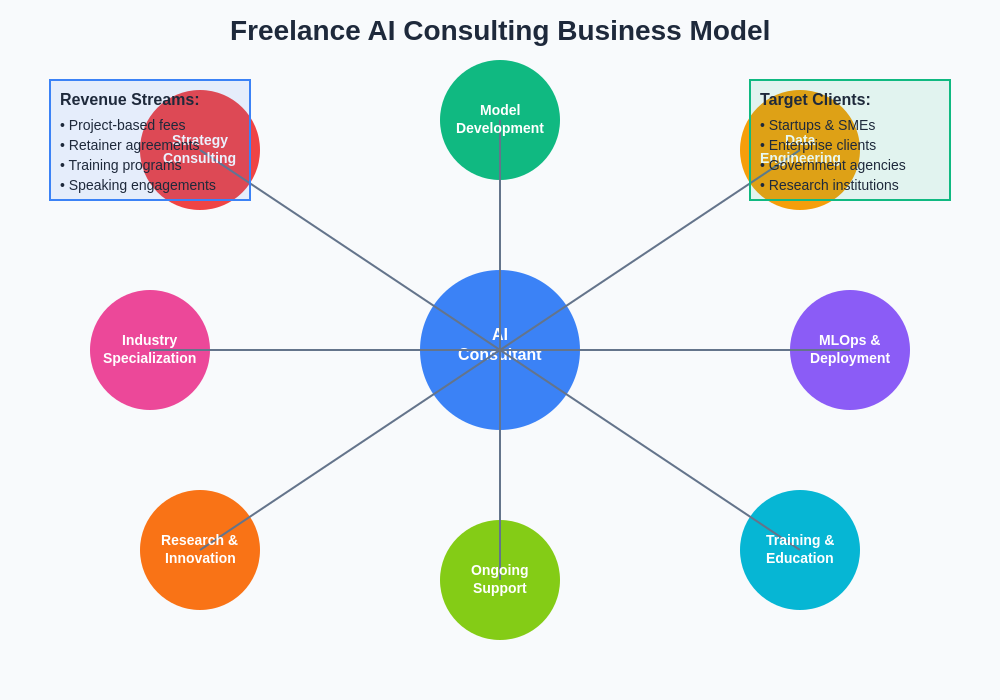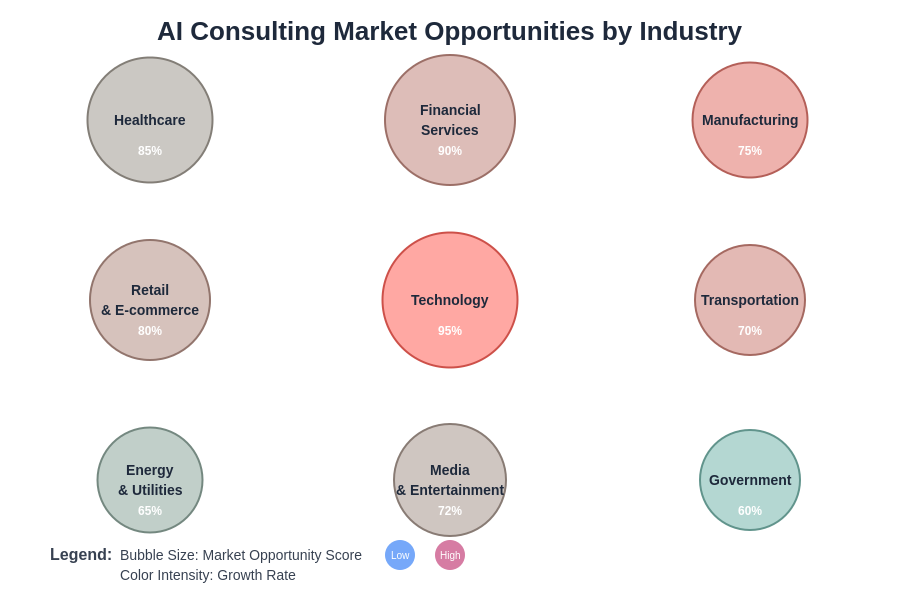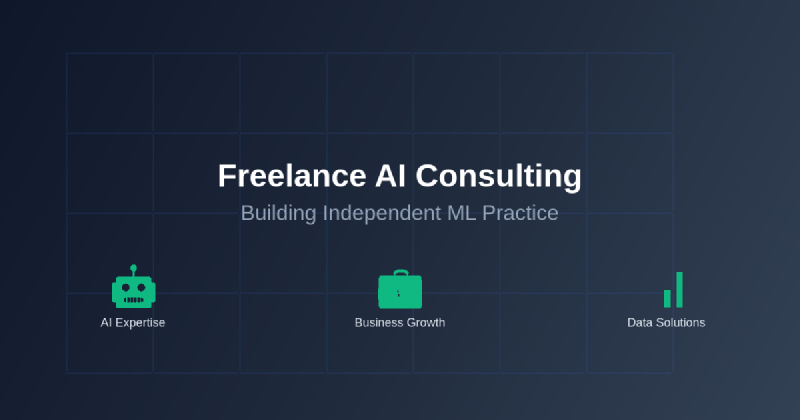The artificial intelligence revolution has created unprecedented opportunities for skilled professionals to establish independent consulting practices, offering specialized machine learning expertise to businesses across industries. The demand for AI solutions continues to surge as organizations recognize the transformative potential of intelligent automation, predictive analytics, and data-driven decision-making systems. This comprehensive landscape presents exceptional opportunities for experienced practitioners to build thriving freelance AI consulting businesses that deliver substantial value while maintaining professional autonomy and financial independence.
Explore the latest AI trends and opportunities to stay informed about emerging technologies and market demands that can shape your consulting practice. The convergence of technological advancement and business necessity has created a perfect environment for independent AI consultants to establish themselves as indispensable partners in organizational digital transformation initiatives.
Establishing Your AI Consulting Foundation
Building a successful freelance AI consulting practice requires a solid foundation built upon technical expertise, business acumen, and strategic positioning within the marketplace. The journey begins with a comprehensive assessment of your existing skills and identification of areas requiring additional development to meet client expectations and industry standards. This foundation encompasses not only technical proficiency in machine learning algorithms, data preprocessing, and model deployment but also essential business skills including project management, client communication, and strategic consulting methodologies.
The technical foundation of an AI consulting practice must encompass a broad spectrum of machine learning disciplines, from supervised and unsupervised learning techniques to deep learning architectures and natural language processing capabilities. Modern AI consultants must demonstrate proficiency across multiple programming languages, with Python and R serving as primary tools, alongside familiarity with cloud platforms such as AWS, Google Cloud, and Azure for scalable model deployment and data processing operations.
Beyond technical capabilities, successful AI consultants must develop a deep understanding of various industry domains to provide contextually relevant solutions that address specific business challenges. This domain expertise enables consultants to translate complex technical concepts into business value propositions that resonate with decision-makers and demonstrate clear return on investment for AI initiatives.
Developing Core Technical Competencies
The technical landscape of AI consulting demands mastery across multiple interconnected disciplines that collectively enable the delivery of comprehensive machine learning solutions. Data science fundamentals form the cornerstone of any AI consulting practice, encompassing statistical analysis, experimental design, and hypothesis testing methodologies that ensure scientifically rigorous approaches to problem-solving and solution validation.
Machine learning expertise must span the full spectrum of algorithmic approaches, from traditional statistical methods to cutting-edge deep learning architectures. Consultants must demonstrate proficiency in feature engineering, model selection, hyperparameter optimization, and performance evaluation techniques that ensure optimal solution quality and reliability. This technical foundation must be complemented by practical experience in data preprocessing, cleaning, and transformation processes that prepare real-world datasets for machine learning applications.
Enhance your AI capabilities with advanced tools like Claude for complex reasoning tasks and comprehensive analysis that can augment your consulting capabilities. The integration of advanced AI assistants into consulting workflows can significantly enhance productivity and solution quality while enabling more sophisticated client deliverables.
Modern AI consulting also requires expertise in MLOps practices that enable scalable, maintainable, and reproducible machine learning systems. This includes proficiency in containerization technologies, continuous integration and deployment pipelines, model versioning, and monitoring systems that ensure production-ready AI solutions meet enterprise standards for reliability and performance.
Business Development and Client Acquisition
The success of a freelance AI consulting practice depends heavily on effective business development strategies that consistently generate qualified leads and convert prospects into long-term clients. This process begins with the development of a comprehensive value proposition that clearly articulates the unique benefits and competitive advantages your consulting practice offers to potential clients across various industry verticals.
Networking and relationship building form the backbone of successful AI consulting practices, requiring active participation in industry conferences, professional associations, and technology meetups where potential clients and collaboration partners congregate. These networking activities must be complemented by thought leadership initiatives including blog writing, speaking engagements, and contribution to open-source projects that demonstrate expertise and establish credibility within the AI community.
Digital marketing strategies play an increasingly important role in client acquisition, encompassing search engine optimization, content marketing, and social media presence that increases visibility and attracts potential clients searching for AI consulting services. A professional website showcasing case studies, client testimonials, and technical capabilities serves as a crucial conversion tool for prospects evaluating potential consulting partners.
The proposal development process requires careful attention to client requirements, project scope definition, and value-based pricing strategies that reflect the significant business impact of well-executed AI implementations. Successful consultants develop standardized proposal templates and project methodologies that streamline the sales process while ensuring consistent quality and professionalism in client interactions.
Project Management and Delivery Excellence
Effective project management represents a critical success factor for freelance AI consulting practices, requiring sophisticated organizational skills and systematic approaches to deliver complex technical projects on time and within budget. The unique challenges of AI projects, including data quality issues, algorithmic uncertainty, and iterative development cycles, demand specialized project management methodologies that accommodate the inherent unpredictability of machine learning development.
Agile project management principles provide an excellent framework for AI consulting projects, enabling iterative development cycles that allow for continuous refinement and adaptation based on emerging insights and changing client requirements. This approach facilitates regular client communication and feedback incorporation throughout the development process, ensuring final deliverables align closely with business objectives and user expectations.
Risk management strategies must address the specific challenges associated with AI projects, including data availability and quality issues, algorithmic performance uncertainty, and regulatory compliance requirements. Proactive identification and mitigation of these risks through comprehensive project planning and contingency development protects both consultant and client interests while maintaining project momentum.
Quality assurance processes for AI consulting projects must encompass both technical validation of model performance and business validation of solution effectiveness. This includes comprehensive testing protocols, performance benchmarking against established baselines, and user acceptance testing procedures that ensure delivered solutions meet specified requirements and performance criteria.

The modern freelance AI consulting business model integrates multiple revenue streams and service offerings that maximize value delivery while ensuring sustainable business growth. This comprehensive approach encompasses everything from initial strategy consulting through implementation and ongoing support services.
Pricing Strategies and Value Proposition
The pricing of AI consulting services requires careful consideration of multiple factors including project complexity, client budget constraints, market conditions, and the substantial business value that successful AI implementations can generate. Value-based pricing models often prove most effective for AI consulting engagements, as they align consultant compensation with the measurable business outcomes achieved through AI implementation.
Hourly billing rates for AI consultants typically reflect the specialized nature of the work and the significant expertise required for successful project delivery. However, project-based pricing models often provide better alignment between client expectations and consultant deliverables while reducing administrative overhead associated with time tracking and billing processes.
Leverage comprehensive research capabilities with Perplexity to stay informed about market trends and pricing benchmarks that inform competitive positioning strategies. Market research and competitive analysis enable more effective pricing strategies that balance profitability with market competitiveness.
Retainer agreements and ongoing support contracts provide valuable recurring revenue streams that stabilize cash flow and enable long-term client relationships. These arrangements often prove mutually beneficial, providing clients with reliable access to AI expertise while giving consultants predictable income and opportunities for deeper engagement with client organizations.
The value proposition of AI consulting services must clearly articulate the transformative potential of machine learning solutions while setting realistic expectations about implementation timelines, resource requirements, and expected outcomes. This balanced approach builds trust and credibility while establishing the foundation for successful long-term client relationships.
Building Strategic Partnerships
Strategic partnerships represent a powerful growth mechanism for freelance AI consulting practices, enabling access to larger projects, complementary expertise, and expanded market reach. These partnerships can take various forms, from informal collaboration agreements with other consultants to formal partnerships with technology vendors, system integrators, and management consulting firms.
Technology partnerships with cloud providers, software vendors, and hardware manufacturers can provide access to cutting-edge tools, preferential pricing arrangements, and co-marketing opportunities that enhance competitive positioning. These relationships often include certification programs and training resources that help consultants stay current with rapidly evolving technology landscapes.
Collaboration with other independent consultants and boutique firms enables participation in larger engagements that require diverse skill sets or additional capacity beyond what a single practitioner can provide. These partnerships must be structured carefully to ensure clear role definitions, equitable compensation arrangements, and shared accountability for project outcomes.
Strategic alliances with management consulting firms and system integrators can provide access to enterprise clients and complex transformation projects that offer significant growth opportunities. These partnerships require careful cultivation and maintenance but can result in substantial revenue growth and enhanced market presence.
Client Relationship Management
Long-term success in AI consulting depends heavily on the development and maintenance of strong client relationships that generate repeat business, referrals, and expanded engagement opportunities. This relationship management process begins during initial client interactions and continues throughout the engagement lifecycle and beyond project completion.
Effective communication strategies form the foundation of successful client relationships, requiring regular progress updates, transparent discussion of challenges and setbacks, and proactive management of client expectations. The technical complexity of AI projects makes clear, jargon-free communication particularly important for maintaining client confidence and engagement throughout project development.
Client education represents a crucial component of relationship management, as many organizations lack the internal expertise necessary to fully understand AI technologies and their implications. Consultants who invest in client education often find that informed clients make better decisions, provide more effective feedback, and become stronger advocates for continued AI initiatives.
Post-project support and maintenance services provide opportunities for ongoing client engagement while ensuring the long-term success of implemented solutions. These services can include model retraining, performance monitoring, and system optimization activities that maintain and enhance solution effectiveness over time.
Scaling Your Independent Practice
The growth trajectory of a freelance AI consulting practice requires careful planning and strategic decision-making to ensure sustainable expansion while maintaining service quality and client satisfaction. This scaling process involves multiple dimensions including service portfolio expansion, team development, operational optimization, and market expansion strategies.
Service portfolio diversification enables consultants to address broader client needs while reducing dependence on any single service offering or market segment. This might include expansion into adjacent areas such as data strategy consulting, AI governance and ethics advisory services, or specialized industry solutions that leverage accumulated domain expertise.
Team expansion strategies must balance the benefits of increased capacity and diverse expertise against the complexities of managing distributed teams and maintaining consistent service quality. This expansion can take various forms including subcontractor relationships, strategic partnerships, or gradual transition toward a larger consulting firm structure.
Operational optimization becomes increasingly important as practice size and complexity grow, requiring investment in project management systems, client relationship management tools, and financial management processes that support efficient operations and professional service delivery.

The AI consulting market presents diverse opportunities across industries and use cases, from healthcare and financial services to manufacturing and retail. Understanding these market dynamics enables more effective targeting and positioning strategies.
Technology Trends and Future Opportunities
The rapidly evolving landscape of artificial intelligence technologies creates continuous opportunities for consultants who stay current with emerging trends and develop expertise in cutting-edge applications. Generative AI technologies, including large language models and multimodal systems, represent particularly significant growth areas that offer substantial opportunities for innovative consulting services.
Edge computing and IoT integration present expanding opportunities for AI consultants as organizations seek to deploy intelligent systems closer to data sources and end users. This trend requires expertise in embedded systems, real-time processing, and resource-constrained optimization techniques that represent specialized consulting niches.
Regulatory compliance and AI governance consulting represents an emerging market opportunity as organizations grapple with increasing regulatory scrutiny of AI systems and the need for responsible AI implementation practices. Consultants with expertise in ethics, fairness, and regulatory compliance can differentiate themselves in this growing market segment.
Industry-specific AI applications continue to present opportunities for consultants who develop deep domain expertise in sectors such as healthcare, financial services, manufacturing, and retail. These specialized applications often command premium pricing due to their complexity and regulatory requirements.
Risk Management and Professional Development
Operating an independent AI consulting practice involves various risks that must be identified, assessed, and mitigated to ensure business sustainability and professional success. These risks encompass technical, financial, legal, and reputational dimensions that require comprehensive risk management strategies.
Technical risks include project delivery challenges, technology obsolescence, and performance guarantee exposure that can impact both project success and consultant reputation. Mitigation strategies include continuous learning, conservative performance commitments, and comprehensive insurance coverage for professional liability.
Financial risks associated with consulting practices include client payment delays, project scope creep, and economic downturns that can impact demand for consulting services. These risks can be mitigated through diversified client portfolios, appropriate contract terms, and financial reserves that provide stability during challenging periods.
Professional development represents both a risk mitigation strategy and a growth enabler for AI consultants. Continuous learning through formal education, certification programs, and hands-on experimentation with emerging technologies ensures consultants maintain competitive expertise and can address evolving client needs.
Legal and compliance risks require careful attention to contract terms, intellectual property protection, data privacy regulations, and professional liability exposure. Working with qualified legal counsel to develop appropriate contracts and business structures provides essential protection for independent practitioners.
Building Thought Leadership
Establishing thought leadership within the AI consulting community provides significant competitive advantages including enhanced credibility, increased visibility, and improved client acquisition opportunities. This thought leadership development requires consistent content creation, active participation in industry discussions, and demonstration of innovative problem-solving capabilities.
Content creation activities include blog writing, white paper development, case study publication, and social media engagement that showcases expertise and insights. These activities must balance technical depth with business relevance to appeal to both technical practitioners and business decision-makers.
Speaking engagements at industry conferences, webinars, and professional meetups provide opportunities to demonstrate expertise while building professional networks and generating leads. Effective speakers often find that these activities generate significant business development opportunities and enhance professional reputation.
Research and innovation activities, including participation in open-source projects, academic collaborations, and experimental applications, demonstrate technical leadership and commitment to advancing the field. These activities often generate valuable intellectual property and competitive differentiators.
The future of freelance AI consulting promises continued growth and evolution as artificial intelligence becomes increasingly integral to business operations across all industries. Success in this dynamic field requires a combination of technical expertise, business acumen, and adaptability that enables consultants to navigate changing market conditions while delivering exceptional value to clients. The investment in building a comprehensive AI consulting practice can yield substantial professional and financial rewards for practitioners who approach the opportunity with strategic planning, continuous learning, and unwavering commitment to excellence.
Disclaimer
This article is for informational purposes only and does not constitute professional, legal, or financial advice. The views expressed are based on current understanding of AI technologies and consulting practices. Readers should conduct their own research and consult with qualified professionals before making business decisions related to freelance AI consulting. Market conditions, technology trends, and regulatory requirements may vary and change over time, potentially affecting the applicability of information presented in this article.
